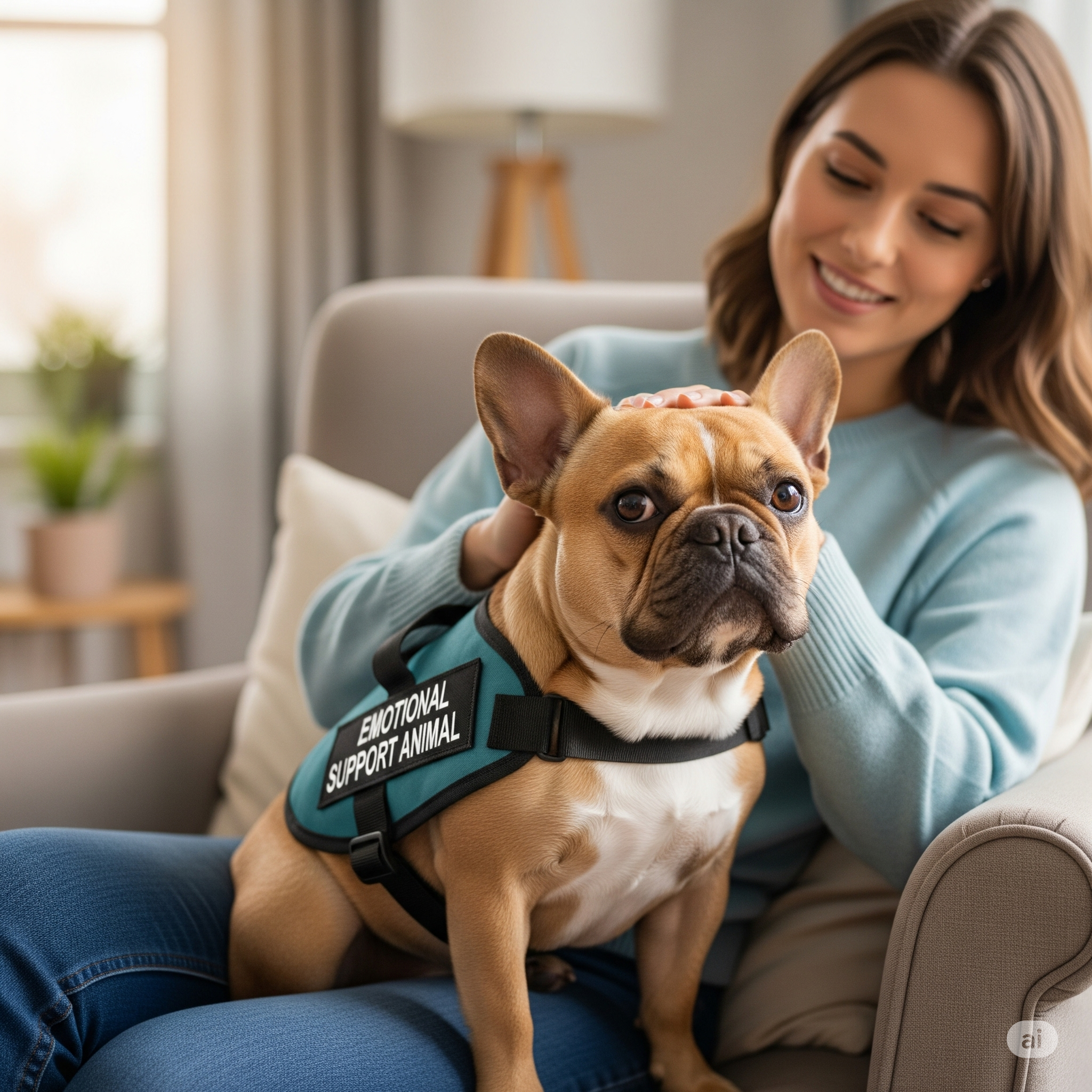For anyone navigating the complex journey of managing mental health challenges like anxiety, depression, or PTSD, Emotional Support Animals (ESAs) can be a true lifeline. They offer consistent, loving companionship that can significantly ease emotional burdens and provide a sense of stability. While many dog breeds possess the qualities to serve as ESAs, few are as uniquely portable, profoundly affectionate, and emotionally attuned as the Chihuahua.
Don’t let their famously small size fool you. Chihuahuas pack immense personalities, a fierce sense of loyalty, and a surprising ability to connect with their human companions on a deep, empathetic level. These remarkable traits make them an excellent choice for individuals seeking an ESA who offers constant presence, a feeling of protection, and unwavering comfort, especially those living in compact spaces like apartments.
In this comprehensive article, we’ll dive deep into the specific qualities that make Chihuahuas ideal emotional support animals, explore the significant mental health benefits they offer, and guide you through the process of how you can obtain a legitimate ESA letter through CertifyESA.
What Exactly Is an Emotional Support Animal (ESA) and What Are Their Rights?
Before we explore the wonders of the Chihuahua, let’s clarify what an ESA is and the important rights that come with having one. An Emotional Support Animal is a companion animal that provides crucial comfort and emotional relief to individuals suffering from a diagnosed mental or emotional condition. Common qualifying conditions include generalized anxiety disorder, major depressive disorder, post-traumatic stress disorder (PTSD), and severe social phobia.
It’s important to understand that ESAs do not require specialized training to perform specific tasks, unlike service animals. As such, they are generally not granted public access rights under the Americans with Disabilities Act (ADA) in the same way service animals are. However, their role in improving emotional well-being is undeniable and profoundly impactful.
A key legal protection for ESA owners falls under the Fair Housing Act (FHA). This federal law dictates that individuals with a valid ESA letter are legally entitled to live with their Emotional Support Animal, even in housing that explicitly prohibits pets (U.S. Department of Housing and Urban Development [HUD], 2020). This means landlords cannot deny housing or charge pet fees or deposits for a legitimate ESA, removing significant barriers for those who need the comfort of their animal at home.
Meet the Chihuahua: A Tiny Dog with a Rich History
Originating from Mexico, the Chihuahua holds the distinction of being the smallest dog breed in the world. Their history is rich, rooted in ancient civilizations where they were revered for their spiritual and emotional significance. Today, these spirited little dogs are celebrated globally for their fiercely loyal nature, inherent alertness, and the deep, unwavering bonds they form with their owners.
Chihuahua Breed Overview:
- Size: Typically weighing a tiny 2 to 6 pounds, making them incredibly portable.
- Temperament: Characterized by their alert and attentive nature, coupled with intense devotion and affection towards their chosen human. They can be confident and sometimes a bit sassy!
- Lifespan: Boasting one of the longest lifespans among dog breeds, often living between 12 to 20 years, offering many years of companionship.
- Coat: Found in two distinct varieties: a smooth, short coat or a long, flowing coat, both relatively low-shedding.
- Exercise Needs: Possess low to moderate exercise requirements, easily met with indoor play and short walks.
Given their diminutive size and adaptable nature, Chihuahuas are especially well-suited for city living, small apartments, or for individuals who need a compact ESA that can genuinely stay close at all times.
Why Chihuahuas Make Exceptional Emotional Support Animals
The unique combination of characteristics found in Chihuahuas makes them remarkably effective in providing emotional support.
1. Unmatched Deep Emotional Attachment
Chihuahuas are renowned for their tendency to bond intensely with one particular person, often choosing a single “favorite human” to follow devotedly and, if needed, fiercely protect. This incredibly close and unwavering bond can be profoundly grounding for individuals grappling with emotional distress, offering a constant source of reassurance, unconditional love, and unwavering loyalty. The feeling of being someone’s entire world can be incredibly comforting.
Research, such as that by Brooks et al. (2018), consistently indicates that deep emotional connections with companion animals like dogs can significantly decrease feelings of loneliness and provide crucial emotional stability during challenging times. Chihuahuas embody this principle, offering a palpable presence that combats isolation.
2. The Ultimate in Portability
Weighing as little as 2 pounds, Chihuahuas are arguably the easiest dog breed to carry and travel with, making them an ideal choice for an ESA. They fit comfortably in dedicated pet carriers, travel bags, or even a specialized purse, and are perfectly content simply being held in your arms or lap. This exceptional portability is invaluable for individuals who travel frequently, need their emotional support during commutes, or benefit from having their ESA by their side during anxiety-inducing public outings.
Their compact size means that even when adhering to specific airline or public transportation guidelines, a Chihuahua ESA can often accompany you, making otherwise overwhelming situations much more manageable.
3. Alertness and a Sense of Protection
Despite their small stature, Chihuahuas possess a surprisingly fierce loyalty and an inherent alertness. Their natural tendency to be vigilant and protective of their chosen human can provide ESA owners with an added layer of security and awareness. This can be particularly helpful for those dealing with generalized anxiety, PTSD, or agoraphobia, where a feeling of vulnerability is often present. Knowing your tiny guardian is always watching can offer a quiet sense of peace.
4. Minimal Space and Exercise Requirements
One of the most practical benefits of a Chihuahua as an ESA is their modest need for space and exercise. They are perfectly content with short daily walks and engaging indoor play sessions, meaning they don’t require large backyards or extensive strenuous activity. This makes them an excellent fit for apartment dwellers, individuals with limited physical mobility, or those who may struggle with fatigue or chronic health conditions, reducing the burden of intensive care.
5. Exceptionally Long Lifespan for Enduring Support
Chihuahuas boast one of the longest lifespans among all dog breeds, often living happily for 12 to 20 years, and sometimes even longer. This remarkable longevity means they can provide long-term, stable companionship, which is especially comforting for individuals seeking an enduring emotional bond and a consistent source of support over many years. The prospect of such extended companionship offers a unique sense of security and continuity.
Profound Mental Health Benefits of Having a Chihuahua ESA
The presence and specific characteristics of a Chihuahua ESA can translate into a wide range of direct and indirect benefits for an individual’s mental health.
For Managing Anxiety Disorders
Chihuahuas are highly intuitive and deeply in tune with their owner’s moods and emotions. They instinctively tend to stay close, initiate physical contact, and become emotionally responsive when symptoms of anxiety arise. The simple act of holding or gently petting a Chihuahua can provide a powerful grounding effect, helping to quiet racing thoughts and bring a profound sense of calmness during moments of panic or overwhelming anxiety. Their physical presence can serve as an anchor to the present.
For Combating Depression
The inherent responsibility of caring for a Chihuahua—which includes routine tasks like feeding, grooming, and dedicated playtime—can instill a much-needed sense of structure and purpose. These routines are essential elements for effectively managing and mitigating the often debilitating effects of depressive episodes. The positive feedback and unwavering affection from the dog reinforce these consistent actions, providing a tangible reward.
Gee et al. (2021) highlight that the establishment of a pet care routine can significantly boost motivation and promote overall mental wellness, particularly in individuals who otherwise struggle to find consistency and purpose in their daily lives.
For Supporting PTSD and Panic Disorders
For someone living with PTSD or prone to panic attacks, having a loyal dog that is consistently near and highly responsive can be incredibly comforting. Chihuahuas often learn to settle comfortably on a lap, remain close during moments of intense stress, and offer a calming physical touch that can help soothe emotional dysregulation and reduce the severity of distressing symptoms like flashbacks or dissociation.
For Addressing Social Anxiety
Chihuahuas, due to their endearing small size and charming looks, often act as natural social buffers. Walking a Chihuahua or having one by your side in a public setting frequently invites friendly attention, curious glances, and gentle conversation from strangers. For individuals who struggle with social anxiety, this can provide a low-pressure and gentle encouragement to engage in social interaction, helping to build confidence and gradually reduce avoidance behaviors in a natural, organic way.
Your Legal ESA Rights with a Chihuahua
If you have a diagnosed emotional or mental disability and a licensed mental health professional determines that a Chihuahua provides essential support for your condition, they can legally prescribe your Chihuahua as an ESA. Once you receive a valid ESA letter, you gain crucial legal protections under the Fair Housing Act (FHA).
Your key ESA rights under the FHA include:
- The Right to Live with Your Chihuahua: You are legally entitled to reside with your Chihuahua in rental housing, even if the property has a strict “no pets” policy.
- Exemption from Pet Fees and Deposits: Landlords are prohibited from charging you pet-related fees, deposits, or pet rent solely because you have a legitimate ESA.
- Protection from Housing Discrimination: You are safeguarded from housing discrimination based on your mental health condition and your need for an Emotional Support Animal.
It’s vital to remember that while ESAs provide immense comfort at home, their legal rights primarily pertain to housing accommodations. ESAs do not have the same public access rights as service dogs under the Americans with Disabilities Act (ADA). This means they generally do not have an automatic right to accompany you into all public places like restaurants, retail stores, or non-pet-friendly flights. However, some airlines or private businesses may choose to accommodate small ESA dogs based on their own discretionary policies. Always check in advance.
How to Get a Legal ESA Letter for Your Chihuahua Through CertifyESA
CertifyESA is dedicated to simplifying the process of obtaining a legitimate ESA letter through a network of qualified licensed mental health professionals in your state. Our process is designed to be easy, confidential, and fully compliant with all legal requirements.
Here’s how it works, step-by-step:
Step 1: Complete a Confidential Mental Health Evaluation Online
Begin by taking a secure, confidential online questionnaire designed to gather information about your emotional or psychological needs and symptoms. This helps us understand your situation and determine if an ESA is appropriate for you.
Step 2: Connect With a Licensed Therapist
Once you’ve completed the evaluation, you’ll be securely matched with a licensed mental health provider who is authorized to practice in your specific state. This professional will conduct a thorough review of your case to determine if an Emotional Support Animal is indeed an appropriate and beneficial component of your mental health treatment plan.
Step 3: Receive Your Official ESA Letter
If, after the evaluation, your case is approved by the licensed mental health professional, you will receive a legally recognized ESA letter. This letter is typically delivered to you via email within a short timeframe, usually 24 to 48 hours. This digital letter is immediately ready to be presented to your landlord or housing authority to formally request reasonable accommodation for your Chihuahua.
To begin this important process and take the next step toward ensuring your beloved Chihuahua can provide you with the emotional support you need without housing barriers, visit CertifyESA.com today.
Essential Daily Care for Your Chihuahua ESA
To ensure your Chihuahua remains healthy, happy, and fully capable of providing the emotional support you rely on, consistent and proper care is crucial. A well-cared-for Chihuahua will be more stable, emotionally attuned, and a more effective companion.
- Feeding: Provide high-quality dog food specifically formulated for small breeds, rich in protein and essential nutrients to support their energetic metabolism.
- Exercise: Their needs are modest; short daily walks and engaging indoor playtime are usually sufficient to keep them physically and mentally stimulated.
- Health Monitoring: Chihuahuas can be prone to certain health issues, such as dental problems and sensitivity to cold. Regular veterinary checkups are essential for preventive care and addressing any concerns promptly.
- Grooming: Smooth-coated Chihuahuas require occasional brushing to maintain coat health. Long-haired varieties will need more frequent and diligent grooming to prevent mats and tangles.
- Emotional Time: These dogs crave affection and thrive on close companionship. Daily cuddling, lap time, gentle petting, and one-on-one interaction are absolute musts for their well-being and for strengthening your bond.
A Chihuahua that is loved, cherished, and well-cared for will undoubtedly return that love tenfold, especially in their invaluable role as your dedicated ESA.
Who Is a Chihuahua ESA Best Suited For?
A Chihuahua can be an ideal choice for an Emotional Support Animal for individuals who:
- Live in small living spaces such as apartments, condos, or smaller homes.
- Need a highly portable emotional support companion that can easily accompany them.
- Have limited physical mobility or prefer a pet with lower exercise demands.
- Value intense, loyal bonding and a strong, devoted attachment from their pet.
- Prefer low-maintenance, low-exercise pets that are relatively easy to care for.
- Desire a long-lived pet for stable, enduring emotional support over many years.
Despite their tiny stature, Chihuahuas offer an abundance of love, comfort, and emotional returns. Their innate ability to stay close, love deeply, adapt seamlessly to small environments, and provide a strong sense of presence makes them a top contender for crucial ESA roles.
Conclusion: The Unseen Strength of a Tiny Friend
Chihuahuas may be small in physical size, but they offer an unmatched abundance of love, unwavering support, and profound emotional security to their owners. As Emotional Support Animals, they excel in their ability to form deep, intimate bonds, remain physically close, and be incredibly emotionally attuned to their human companions. Their compact size combined with their enormous hearts make them perfect partners in navigating and managing daily mental health challenges, providing a constant source of calm and connection.
If your Chihuahua already brings significant comfort and stability into your life, and you believe they provide essential support for your anxiety, depression, PTSD, or other emotional disorders, taking the next step to make their role official is a wise choice. CertifyESA can help you obtain a legally recognized ESA letter quickly and securely, ensuring that your beloved furry companion can continue supporting you without facing unnecessary housing restrictions or additional fees.
References
Brooks, H. L., Rushton, K., Lovell, K., Bee, P., Walker, L., Grant, L., & Rogers, A. (2018). The power of support from companion animals for people living with mental health problems: A systematic review and narrative synthesis of the evidence. BMC Psychiatry, 18(1), 31. https://doi.org/10.1186/s12888-018-1613-2
Gee, N. R., Mueller, M. K., & Curl, A. L. (2021). Human–animal interaction and older adults: An overview. Frontiers in Psychology, 11, 585343. https://doi.org/10.3389/fpsyg.2020.585343
U.S. Department of Housing and Urban Development. (2020). Assessing a person’s request to have an animal as a reasonable accommodation under the Fair Housing Act. https://www.hud.gov/sites/dfiles/PA/documents/HUDAsstAnimalNC1-28-2020.pdf





